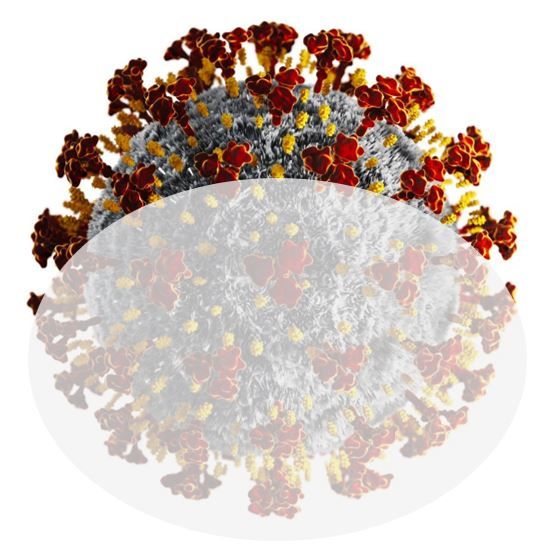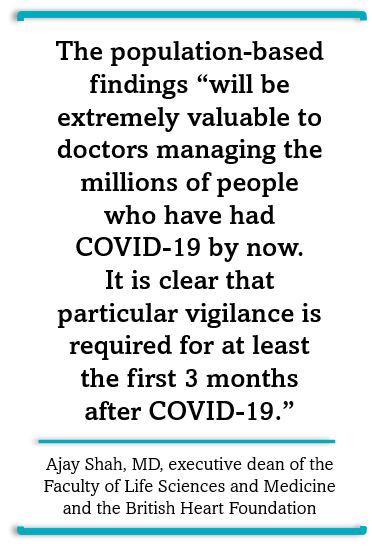- Clinical Technology
- Adult Immunization
- Hepatology
- Pediatric Immunization
- Screening
- Psychiatry
- Allergy
- Women's Health
- Cardiology
- Pediatrics
- Dermatology
- Endocrinology
- Pain Management
- Gastroenterology
- Infectious Disease
- Obesity Medicine
- Rheumatology
- Nephrology
- Neurology
- Pulmonology
Risks for Diabetes and CVD Spike in Early COVID-19 Infection, May Diminish Over 12 Months

Among patients who contract COVID-19 the risk of being diagnosed with diabetes mellitus type 1 (diabetes) and cardiovascular disease (CVD) increases significantly but temporarily, accordig to new data from investigators in the United Kingdom. The risk appears hightest during the first 3 months after infection, they found, and then declines, returning to baseline levels.
Specifically, the analysis of anonymized EHR data from more than 1300 family practice locations in the UK comprising information on more than 850 000 individuals found during acute COVID-19 an increase of 81% in diabetes diagnoses and a 6-fold increase overall in CV diseases, the latter driven primarily by a spike in pulmonary embolism.
The net incidence of diabetes increased during the first 4 weeks from the index date of infection and remained elevated by 27% from weeks 5 to 12. CVD incidence rose during the first 4 weeks as well, then demonstrated a net decrease from week 13 to week 52.
The time intervals used are based on a guideline published by NICE, SIGN, and RCGP that makes a distinction between “acute COVID-19” in the first 4 weeks after infection; “post-acute COVID-19” (“ongoing symptomatic COVID-19”), from 5 to 12 weeks after the first infection; and “long COVID-19” (“post-COVID-19 syndrome”) with symptoms persisting for more than 12 weeks after infection, the authors explain.
As context for the study’s focus on diabetes and CVD, the authors cite existing data on the association between acute COVID-19 and both cardiometabolic conditions but the paucity of studies on longer-term outcomes that would reveal whether patients remain at increased risk for the diseases. The team was specifically interested in whether new diagnoses of DM and CVD are increased over 12 months among patients who have had COVID-19 compared with a matched set of control patients who did not contract the virus.
Tapping the UK’s Clinical Practice Research Datalink, a research team led by Emma Rezel-Potts, PhD, a research associate in tranlsational epidemilology and public health at Kings College London, accessed longitudinal data for 516 985 residents with a COVID-19 diagnosis. After exclusion for prevalent diabetes or CVD, the final group of participants numbered 431 193. This cohort was matched by year of birth, sex, and family physician practice to an equal number of people without the diagnosis as controls. Eligibility for the control group also excluded any patient with diabetes or CVD.
Of primary interest to the research team were first recorded diagnoses of cardiovascular disease and diabetes. Follow-up times, as noted above, comprised 3 specific categories: 4 weeks from index date, 5-12 weeks from index date, and 13-52 weeks from index date.

Findings: Disease spike, return to baseline
In multivariable adjusted analyses the investigators report that net incidence of diabetes was increased in the first 4 weeks following COVID-19 infection (aRR, 1.81 [95% CI, 1.51-2.19]) and remained elevated from 5 to 12 weeks (aRR 1.27, 1.11-1.46) but not from 13 to 52 weeks overall (aRR, 1.07 [95% CI, 0.99-1.16]).
Regarding diagnoses of CVD the research team found acute COVID-19 was associated with a net increase in incidence (aRR, 5.82 [95% CI, 4.82-7.03]), including incidence of pulmonary embolism (aRR, 11.51 [95% CI, 7.07-18.73]), atrial arrhythmias (6.44, 4.17 to 9.96), and venous thrombosis (aRR, 5.43 [95% CI, 3.27-9.01]).
The incidence of CVD, they found, declined from weeks 5-12 (aRR, 1.49 [95% CI, 1.28-1.73]) and showed a net decrease from 13-52 weeks (aRR, 0.80 [95% CI, 0.73-0.88]).
“Use of a large, national database of electronic health records from primary care has enabled us to characterise the risk of cardiovascular disease and diabetes mellitus during the acute and longer-term phases following Covid-19 infection,” said Rezel-Potts in a news statement. “Clinical and public health interventions focusing on reducing diabetes risk among those recovering from Covid-19 over the longer-term may be very beneficial,” she added.
Rezel-Potts coauthor Ajay Shah, MD, executive dean of the Faculty of Life Sciences and Medicine and the British Heart Foundation, adds that the population-based findings “will be extremely valuable to doctors managing the millions of people who have had COVID-19 by now. It is clear that particular vigilance is required for at least the first 3 months after COVID-19.”
Reference: Rezel-Potts E, Douiri A, Sun X, Chowienczyk PJ, Gulliford MC. Cardiometabolic outcomes up to 12 months after COVID-19 infection. A matched cohort study in the UK. PLOS One. 2022;19(7):e1004052. https://doi.org/10.1371/journal.pmed.1004052
